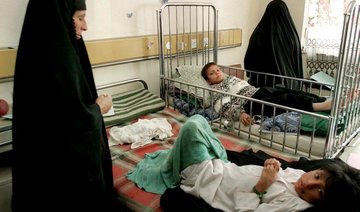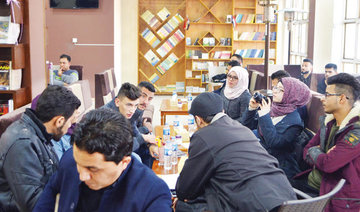BAGHDAD: Months after declaring victory over extremists, war-battered Iraq hopes to attract billions of dollars from private investors as well as donors to fund its reconstruction.
Baghdad is looking to drum up funds at a reconstruction conference in neighboring Kuwait from February 12 to 14 after announcing the defeat of Daesh at the end of last year.
The country is still reeling from the rise of Daesh and the punishing fightback it took to crush the jihadists, with swathes of its territory in ruins and millions of people displaced.
Authorities in the resource-rich nation say there has been a heavy toll on oil, electricity and manufacturing infrastructure, as well as basic services such as water and sanitation.
Iraq needs to raise $100 billion to rebuild, Prime Minister Haider Al-Abadi has said, after the fight against Daesh and decades of sanctions and war.
“It’s a huge amount of money. We know we cannot provide it through our own budget,” he said at the World Economic Forum in Davos, Switzerland last month.
“That’s why we now resorted to investment,” he said.
Iraq sits on some of the world’s largest crude reserves, which Baghdad puts at 153 billion barrels, but the war against IS and a slump in world prices have diminished its oil revenues.
The Kuwait conference’s second day will be devoted to the private sector’s role in rebuilding Iraq, with more than 2,000 companies and businessmen due to attend, according to the Gulf country.
International organizations are to speak on the first day, while attending donor countries are expected to make announcements on the third.
The US State Department has said that rather than “direct contributions,” Washington has “focused on the private sector. It has teamed up with the US Chamber of Commerce to organize a delegation of over 150 American companies to travel to Kuwait” for the conference.
Iraq — the second largest producer within OPEC after Saudi Arabia — has already called for help from investors worldwide, even as it seeks to ramp up output from its largely untapped reserves.
Kuwait is setting aside its past differences with Iraq to host the summit.
In August 1990, Iraq invaded Kuwait after accusing its neighbor of “stealing” Iraqi oil from a field straddling the border.
That sparked the first Gulf War, which ended after a US-led coalition ousted Iraqi forces from the emirate.
Iraqis have since weathered international sanctions, a US-led invasion in 2003 and the battle against Daesh.
Today, some 2.6 million people remain displaced across the country, the International Organization for Migration has said.
Satellite imagery shows some 26,000 houses are destroyed or seriously damaged, including more than 17,000 in the extremists’ former bastion of Mosul.
“There is huge destruction and a huge need to mobilize support,” said Erfan Ali, Iraq representative of the UN Human Settlements Programme.
Ali said there are big hopes the private sector will play a major role in rebuilding, offering “innovative solutions” to tackle the country’s problems.
Attracting investors will be no easy task in a country ranked as the world’s tenth most corrupt in Transparency International’s 2016 Corruption Perceptions Index.
But Ali said companies and businessmen will have access to a “reconstruction data platform to ensure accountability and transparency.”
Peter Hawkins, representative for the UN children’s fund in Iraq, says reconstruction will be a mammoth task — not just in Mosul, retaken from Daesh last July after several months of fighting, but also elsewhere.
Though much of the battle against IS took place in northern Iraq, its southern provinces have also suffered from government budget cuts during the conflict.
Overstretched schools in the south teach children in two or three shifts, the UNICEF official said.
Iraq — where nearly a quarter of the population survive on less than $2 a day — needs “major investment in health, education, social warfare” and water resources, he said.
Above all, educating young Iraqis is a chief concern, Hawkins said.
“If we do not start to invest in children’s education today, this generation will be lost and will not be able to contribute to the economy and the security of Iraq when they grow up.”
Iraq banks on private sector for post-Daesh reconstruction
Iraq banks on private sector for post-Daesh reconstruction

Palestinian health ministry says 4 killed in Israeli West Bank strike

RAMALLAH: The Palestinian health ministry said Thursday that an Israeli air strike on a car killed four Palestinians and wounded three near the occupied West Bank city of Tulkarem.
The ministry announced that the Palestinians were killed “as a result of the (Israeli) bombing of a vehicle in Tulkarem camp,” which the Israeli army did not immediately confirm to AFP.
Turkiye, Iran leaders at Muslim summit in Cairo

- Relations between Egypt and Iran have been strained for decades, but diplomatic contacts have intensified since Cairo became a mediator in the war in Gaza
CAIRO: The leaders of Turkiye and Iran were in Egypt on Thursday for a summit of eight Muslim-majority countries, meeting for the first time since the ouster of Syria’s president Bashar Assad.
Turkiye historically backed the opposition to Assad, while Iran supported his rule.
The gathering of the D-8 Organization for Economic Cooperation, also known as the Developing-8, was being held against a backdrop of regional turmoil including the conflict in Gaza, a fragile ceasefire in Lebanon and unrest in Syria.
In a speech to the summit, Turkiye’s Recep Tayyip Erdogan called for unity and reconciliation in Syria, urging “the restoration of Syria’s territorial integrity and unity.”
He also voiced hope for “the establishment of a Syria free of terrorism,” where “all religious sects and ethnic groups live side by side in peace.”
Iranian President Masoud Pezeshkian urged action to address the crises in Gaza, Lebanon and Syria, saying that it is a “religious, legal and human duty to prevent further harm” to those suffering in these conflict zones.
Pezeshkian, who arrived in Cairo on Wednesday, is the first Iranian president to visit Egypt since Mahmoud Ahmadinejad, who visited in 2013.
Relations between Egypt and Iran have been strained for decades, but diplomatic contacts have intensified since Cairo became a mediator in the war in Gaza.
Foreign Minister Abbas Aragchi visited Egypt in October, while his Egyptian counterpart Badr Abdelatty traveled to Tehran in July to attend Pezeshkian’s inauguration.
Ahead of the summit, the Iranian top diplomat said he hoped it would “send a strong message to the world that the Israeli aggressions and violations in Gaza, Lebanon and Syria” would end “immediately.”
Erdogan was in Egypt earlier this year, and discussed with President Abdel Fattah El-Sisi economic cooperation as well as regional conflicts.
Established in 1997, the D-8 aims to foster cooperation among member states, spanning regions from Southeast Asia to Africa.
The organization includes Egypt, Turkiye, Iran, Nigeria, Pakistan, Bangladesh, Indonesia and Malaysia as member states.
Iraq begins repatriating Syrian soldiers amid border security assurances

DUBAI: Iraq has begun the process of returning Syrian soldiers to their home country, according to state media reports on Wednesday.
Lt. Gen. Qais Al-Muhammadawi, deputy commander of joint operations, emphasized the robust security measures in place along Iraq’s borders with Syria.
“Our borders are fortified and completely secure,” he said, declaring that no unauthorized crossings would be permitted.
Muhammadawi said that all border crossings with Syria are under tight control, stating: “We will not allow a terrorist to enter our territory.”
Turkiye won’t halt Syria military activity until Kurd fighters ‘disarm’

ISTANBUL: Turkiye will push ahead with its military preparations until Kurdish fighters “disarm,” a defense ministry source said Thursday as the nation faces an ongoing threat along its border with northern Syria.
“Until the PKK/YPG terrorist organization disarms and its foreign fighters leave Syria, our preparations and measures will continue within the scope of the fight against terrorism,” the source said.
Hamas says Israeli strikes in Yemen ‘dangerous development’

GAZA: Palestinian militant group Hamas said Thursday that Israel’s strikes in Yemen after the Houthi rebels fired a missile at the country were a “dangerous development.”
“We regard this escalation as a dangerous development and an extension of the aggression against our Palestinian people, Syria and the Arab region,” Hamas said in a statement as Israel struck ports and energy infrastructure in Yemen after intercepting a missile attack by the Houthis.











